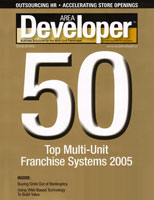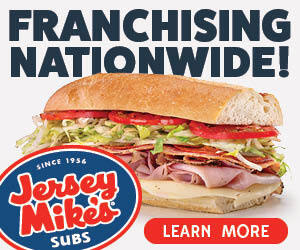Developing Pools of Talent: Upward mobility is the key
In my previous column, I discussed the first two pieces of how to build an organization that grows your franchise business. Part one was planning the structure of your organization over time, based on your territory, market, or development growth in terms of your team. Part two focused on the functional role of individuals within the organization. The third piece is how to develop pools of talent.
Anybody I've talked to who has been very successful over 10, 15, or 20 years of multi-unit growth has said that the key for them is creating upward mobility. This means making it possible for people to grow to a higher level of responsibility, not only through training or learning, but also though on-the-job experience and an incentive to stay with the company. I think all of us in multi-unit franchising today are looking for long-term, quality people. Here are six ways you can develop pools of talent who stay.
1) Block time to grow the team. In a multi-unit franchisee environment, I have to make sure that a certain percentage of my time as a franchisee is blocked to grow teams, to work on training programs,to develop a recruiting process, and to meet with key employees who can be a referral base. I always say that the greatest employees will come from employees who are great that I already have. So I have to block my time, and I have to commit to that block of time.
I have a truth that says: Don't give me your goals until you give me the amount of time you're willing to commit to make those goals work. The truth is goals without time blocked never get done.
2) Develop a "genetic code." Best practices for building a pool of talent is to build an expectation profile of what you want your culture to be. In other words, I want everybody to feel like they have psychological ownership of the store. That's a genetic code to me. They take pride in the store; they're willing to believe that anything that goes on in that store can affect them. They get out of their car when they arrive atwork, walk through the parking lot, and if there's a piece of paper there they pick it up and put it in the dumpster. That's a genetic code to me of a culture of success. They don't look at that piece of paper and say,"Hey, the other shift should have gotten that done."
A genetic culture code is everybody on the team always needs to be talking about the positive aspects of working there. That's what helps recruit and grow and attract good people in these markets. You say,"Well, there are a lot of people out there." Well, I don't look for numbers of available talent in the marketplace to work in the stores or to be store managers or area managers. I'm looking for high-quality people who have management potential�and that's a much smaller universe than the whole universe of people out there looking for a job. Genetic code to me is where things happen without a manager hanging over the top of somebody. It becomes a natural part of the day.
3) Target clusters of talent to grow your team. If I've discovered that I have a person who has great management potential, I try to figure out where they came from when we hired them. What were they doing before they came to us? And all of a sudden I've discovered that dental hygienists make great store managers. Because one of the people I have,or two of the people I have, were formerly dental hygienists. Or maybe they were in retail and they came out of a specific kind of store environment. Maybe they were in hardware, and I found out people inhardware need to be multi-dexterous. So why am I looking everywhere?Why don't I try to go back to that source and see if there's some way to create visibility there?
An acquaintance of mine recruits young people to work in his service station from tech classes at community colleges. He used to just put ads in the paper and found that he wasn't very successful. He could hire people, but the people he was hiring did not have the characteristic she wanted. After analyzing where some of his best people came from, hediscovered they came from community college technical classes�not necessarily auto classes. So every year he would go to the technicalcollege and speak about business; the teachers would invite him into the classroom. Then he would do a visitation day at his service station where the kids could sign up. The community college eventually started giving the kids credit to spend an hour or two at his station, and all of a sudden his pool of talent started coming out of this. If the technical college needed a textbook, he would underwrite the cost if they'd puthis name in it. That's how he started getting visibility, and it was just phenomenal over a period of time: a) the quality of the people he was able to attract, and b) the similarity of the profile that he was able to get from targeting that cluster.
4) Build an integrated recruiting program. In the example above,you see that he didn't just do one thing. He didn't just go over and speak and expect kids to show up at his station for jobs. He didn't just run an ad in the paper. He didn't just put out a flyer. He built what I call an integrated program: he took four or five things and brought them together. He had a visitation day, he spoke at the classes, he sponsored and underwrote some of the books, and he put out flyers. He also used his own people to recruit by creating a kind of internal recruiting program, with an incentive for the people he already employed to pass out little cards to their friends that said, "We are growing our team because our business is growing. We are looking for our team members
who are interested in..." And he would list what kinds of opportunities were available. They would pass these cards out, put their initials on them, and if one of those cards bounced back and one of his people was able to recruit somebody, they would get some kind of incentive, simple things like a monogrammed shirt or a billed cap with a logo on it.
5) Develop a value benefits card. Put together a little flyer or brochure that explains the benefits of working in one of your stores, or as a store manager or area manager. In other words, why is it so great working for your organization? Because you have other great people I can work with;you have training programs to increase my skills; you have upward mobility so I can advance in your organization; I'll have retreat days where I can be with other people in your organization and learn more about what it takes to grow; you have a great product; you have an incentive program; or you have a dollar-for-dollar back-to-school program.
That's what I call value benefits. Not compensation. Compensation is only one component of value benefits. Unfortunately, most of us make the mistake of focusing on compensation as a value to work here. And in today's marketplace, that falls truly into a very low stratum of enticement for most people who are above the first job level. People want more than just decent pay. That's why statistics show that so many people are on the Internet every night looking for a job. It's not necessarily because of pay scale, it's because of opportunity. How do you define opportunity.
6) People want to work where there's a performance standard. Good people are attracted to environments where there's a performance standard, not just a job description. People want to know what's expected, when it's expected, and how well they're doing. If you're just laying out job descriptions, rather than performance standards, people don't know what the benchmark is.
I always love to speak on college campuses, and I always love to ask kids who they remember from high school. Invariably they will mention a coach or somebody within athletics. And I will ask, "Why is that?" They say,"Because we always knew where we stood. If we didn't come to practice, we didn't suit up for the game." They always had a performance standard. People are attracted to that. It's the same way in the work environment.
If I'm an assistant manager, what performance standard requirement do I have in order to move to store manager? If I'm a store manager, what performance standard requirement do I have to move to senior store manager? If you can't move them to area manager, at least make them senior store manager. What does that mean? I don't know. Come up with something: They've been there three years, they've grown their store at such and such a percentage every year, they've reduced their turnover to such and such a level, they've trained at least two assistant managers and one manager.
People like upward mobility and certainly there has to be some benefit to that. People get stuck at store manager and don't have upward mobility.
Every three years give them an added title�senior store manager, advisor store manager�and give them a little more involvement in the long-term planning of your whole organization. Have a day for your senior store managers if you get that big, or if you get that successful, or if you keep people that long. Because people don't need compensation necessarily to feel like they're moving up. They want to feel like they have more input on their job, on the organization. That's moving up.
So, standards of performance, what are they? At one of the first jobs I had, I checked bathrooms, and I had to sign in when I was there and cleaned them. That has stuck with me all my life. Why was I in that bathroom? Because I knew what the performance standard expectation was. And I've applied that to everything I do.
Thomas Winninger has been referred to as America's Market Strategist. His expertise is in value differentiation and revenue growth and he speaks at over 75 conferences each year. His message has appeared in over 300 trade publications and he is author of four books. View Winninger live atwww.winninger.com.
Share this Feature
Recommended Reading:
FRANCHISE TOPICS
- Multi-Unit Franchising
- Get Started in Franchising
- Franchise Growth
- Franchise Operations
- Open New Units
- Franchise Leadership
- Franchise Marketing
- Technology
- Franchise Law
- Franchise Awards
- Franchise Rankings
- Franchise Trends
- Franchise Development
- Featured Franchise Stories
FEATURED IN

Multi-Unit Franchisee Magazine: Issue 3, 2005

$250,000
$250,000





 The multi-unit franchise opportunities listed above are not related to or endorsed by Multi-Unit Franchisee or Franchise Update Media Group. We are not engaged in, supporting, or endorsing any specific franchise, business opportunity, company or individual. No statement in this site is to be construed as a recommendation. We encourage prospective franchise buyers to perform extensive due diligence when considering a franchise opportunity.
The multi-unit franchise opportunities listed above are not related to or endorsed by Multi-Unit Franchisee or Franchise Update Media Group. We are not engaged in, supporting, or endorsing any specific franchise, business opportunity, company or individual. No statement in this site is to be construed as a recommendation. We encourage prospective franchise buyers to perform extensive due diligence when considering a franchise opportunity.